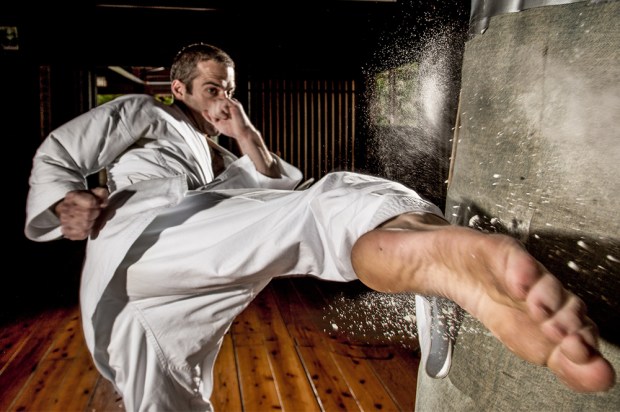Things that I once loved — Fifth Avenue & 57th Street, brownstone terraces on hot summer afternoons, cold beer and fried eggs at 5 a.m. after a night of carousing, the Sherry-Netherland — and now miss have grown ever more monumental upon reflection. I suppose that it’s normal to miss things you loved when young, yet I still can’t get over how the people have changed — for the worse, needless to say.
The city is at its best very early in the morning, the asphalt glistening after the rain or the water trucks that occasionally wash the avenues, the streets empty and still as a movie set. In the old days, on muggy nights, people used to sleep on the fire escapes in their underwear. Returning from a nightclub, especially when up in Harlem, I’d see those we then called the ‘wops’ and the ‘micks’ sleeping in their shorts and bid them goodnight. You’d get the occasional F-word in response, but that was rare. Now the F-word is a verb, an adjective, an adverb and a noun.
The Italians and the Irish are now gentrified and have moved to the suburbs, and if they saw their children sleeping outdoors in their underwear they’d scream bloody murder. Everyone has air-conditioning nowadays, and the only reason for sleeping al fresco is to get away from the chill.
The current runaway bestseller is a gem, Hillbilly Elegy by Scots-Irish Ohio native J.D. Vance. Vance grew up poor in the Rust Belt, in an Ohio steel town that has been haemorrhaging jobs since the 1970s. He became successful in Silicon Valley after serving in the Marine Corps and in Iraq. I loved it, especially the bit about pajamas. Poor people don’t wear pajamas, he writes; they wear underwear or sleep naked. Rich people wear pajamas. I concur. I never saw anyone wearing pajamas sleeping on the fire escape when I was young.
Fire escapes are still around on the houses that greedy individuals haven’t destroyed and replaced with glass, but the Latinos, blacks and Asians who live in them now have air-conditioning. And they have television and headphones and lots to complain about when their cable breaks as Con Ed digs up the streets to repair old wires. Of course nothing has changed more than the small-town feeling the old New York had in spades. The city used to be a collection of small villages and different ethnic communities. There was Germantown, Little Italy, Chinatown and Harlem, all connected by wide avenues and drives along the banks of the Hudson. (I’m talking about Manhattan.) Then untalented, stupid, butcher-like architects and city planners decided to improve the place, displacing storefronts and other points of congregation where a merchant could sell his wares and keep an eye on the baby sleeping inside. The biggest criminal of all was Robert Moses, the man who not only ruined New York and wiped out whole communities by laying down asphalt turnpikes for absolutely no reason except what he saw as progress, but who also planned to do away with Greenwich Village and replace it with a five-lane highway. Thankfully, the monster croaked before any more catastrophic modernising could take place.
When I’m in Manhattan, I walk everywhere, and when I see rows of lovely townhouses and low-rise multifamily dwellings nostalgia hits like the proverbial gong: a snatched kiss with a married lady during Thanksgiving 1962, a song on the radio in a convertible outside a young girl’s house with her roommates looking down at us. Even Robert Moses’s ravages cannot take away those memories.
But gosh — to use an old-fashioned expression — how things have changed. Gossip columns only write about real deplorables now, celebrity scum from reality shows and rap singers. In a 1947 film Mother Wore Tights, the delectable Betty Grable’s daughter, the exquisite Mona Freeman, is a student in a prestigious boarding school in the northeast. When her parents, who are actors, are booked to perform in a show in the town where her school is located, Mona dies of embarrassment. There is a happy ending, of course, but back in the good old days one didn’t mix with actors if one could help it. Don’t put your daughter on the stage, advised Sir Noël, obviously with tongue in cheek. Now being the daughter of a preferably strung-out, ugly rock star means instant celebrity for the daughter and immediate acceptance to any school. Better yet, just watch any old black-and-white movie, gangster films included. A woman walks in and everyone stands up and sort of bows or kisses her hand. If one did that in a nightclub today, rappers would take umbrage and think you were taking the micky.
Nah, give me the old neighbourhood any time, lined with the local pharmacy which, in its heyday, had a soda bar and served ice-cream floats, the pawnshop, the butcher, the local laundry — and yes, I’m talking about New York’s Manhattan, not some small town in Ohio. And don’t forget those great fire escapes on the dark-red brick buildings that Edward Hopper loved so much, and the people sleeping on them in their underwear during hot nights. And may it get even hotter for you, Robert Moses, down where you are in hell. You only have ten billion years to go, you rotten bum.
Got something to add? Join the discussion and comment below.
Get 10 issues for just $10
Subscribe to The Spectator Australia today for the next 10 magazine issues, plus full online access, for just $10.
You might disagree with half of it, but you’ll enjoy reading all of it. Try your first month for free, then just $2 a week for the remainder of your first year.














Comments
Don't miss out
Join the conversation with other Spectator Australia readers. Subscribe to leave a comment.
SUBSCRIBEAlready a subscriber? Log in